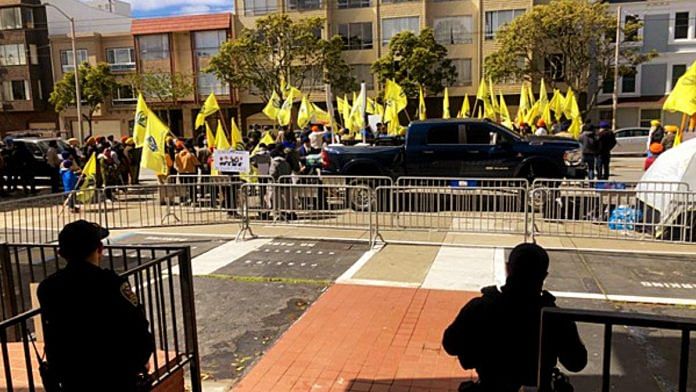The recent incident of the Indian consulate in San Francisco being set on fire by individuals owing allegiance to the so-called Khalistan movement is yet another example of anti-India activity occurring abroad. This consulate has previously been targeted, with a group of pro-Khalistan elements attacking and vandalising the office during the Punjab police’s search operations against Amritpal Singh, who portrays himself as a “Khalistan leader” in the vein of the slain terrorist Bhindranwale. New Delhi promptly expressed its protest to then-US Charge d’Affaires in India. The repetition of vandalism at the same place exposes a careless attitude on the part of US security agencies, which New Delhi should take note of.
In another incident, flags designed by pro-Khalistan elements were waved at a meeting addressed by Congress leader Rahul Gandhi during his visit to the US. Shockingly, the Congress scion neither protested nor condemned this act in his speech, seemingly overlooking the fact that these elements were “celebrating” the assassination of his grandmother.
During an event in Brampton, a town in Greater Toronto, Canada, pro-Khalistani elements observed what they labelled “shaheedi diwas” (martyrdom day) to mark the 39th anniversary of Operation Bluestar, when then-Prime Minister Indira Gandhi ordered the flushing out of militants holed up in the sacred Golden Temple. One of the floats in the event depicted two Sikh security guards firing bullets at a the effigy of Indira Gandhi. Despite opposition leaders in Canada condemning the event, the Peel Regional Police (PRP) concluded that the float did not constitute a hate crime. This shows that the local security officials need a lesson in diplomacy and history.
Under Canadian election laws, prospective candidates seeking political office must submit a list of a minimum number of supporters. Over the past two decades, the proportion of Canada’s Sikh population has more than doubled, from 0.9 percent to 2.1 percent, and Punjabi is the second most spoken language (29.4 percent) among South Asian settlers. While most Canadians remain disinterested in electoral politics, the Sikh community tends to rally around their leaders and typically supports candidates favoured by community leaders. Unfortunately, many of these groups have fallen under the influence of pro-Khalistan elements. Consequently, elected candidates rarely take actions or make statements that would displease Sikh leaders.
Also read: ‘Air India ki flight mat lo’ — how Canadian neglect led up to Kanishka bombing 38 yrs ago
West must learn the lesson
There have been reports of radical elements circulating posters on social media announcing a “Kill India” rally in London. These posters feature photographs of Indian diplomats, falsely labelling them as killers of terrorist Hardeep Nijjar in Vancouver last month. It is crucial to recognise that these radical elements represent only a minuscule percentage of the hardworking Sikh community that has migrated to these countries in search of a livelihood. The ugly chapter of Khalistani terrorism was decisively ended in the late 1980s, although not without significant cost. The demand for Khalistan has no support within India, but some extremist leaders have since migrated to the US, Canada, Australia, the UK, and other countries.
These radical elements not only exploit the local Sikh community through religious institutions but also receive substantial funding from Pakistan’s deep state and its intelligence agency, the ISI. The US Department of State’s Country Report on Terrorism 2019: Pakistan explicitly highlighted that “Pakistan continued to serve as a safe haven for certain regionally focused terrorist groups. It allowed groups targeting Afghanistan, including the Afghan Taliban and affiliated HQN [Haqqani Network], as well as groups targeting India, including LeT [Lashkar-e-Tayyaba] and its affiliated front organizations, and JeM [Jaish-e-Mohammed], to operate from its territory.” The proliferation of Khalistan outfits is part of this terror funding project.
If the use of Pakistani territory for anti-India activities is considered wrong and justifies strong proactive action by India, then it is equally unacceptable for the US, UK, Australia, Canada, and other countries to allow their territories to be used for anti-India activities under the guise of “democratic freedom”. None of these countries can expect India to maintain normal trade and diplomatic relations while terrorist groups that target India are allowed to breed in their backyards.
The organisation Sikhs For Justice (SFJ) is banned in India, and countries where this outfit operates should promptly ban it and other outfits that thrive on terror funding. As Hillary Clinton once said about Pakistan, the same applies to these countries: “You can’t keep snakes in your backyard and expect them only to bite your neighbors. You know, eventually those snakes are going to turn on whoever has them in the backyard.”
The countries where these elements are rearing their ugly heads should be more concerned than India. India is fully capable of handling these elements within its domestic jurisdiction. Anyone acting against India’s national interests anywhere in the world should be treated as an enemy of the country and dealt with accordingly. It is not difficult to identify these individuals and take measures such as cancelling their passports, confiscating their properties in India, and revoking their Overseas Indian Citizen (OIC) cards. If asked to leave the country where they have sought adoption, they should be treated as persona non grata and rendered stateless.
Tolerance of intolerant groups and their terror activities will ultimately lead to anarchy, and no country is immune to the danger of being overrun by such intolerant outfits. The recent events in France serve as a lesson that the West should learn from.
Seshadri Chari is the former editor of ‘Organiser’. He tweets @seshadrichari. Views are personal.



